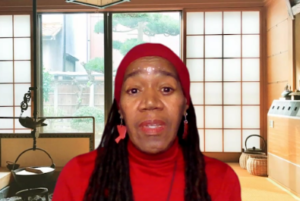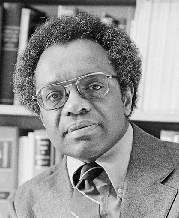By Harold C. Ford
The most recent Tendaji Talk tackled the tough, divisive topic of critical race theory (CRT) during a 90-minute, virtual meeting of 15 Flint-area persons. Joyce Piert, formerly an instructor at Beecher Schools and the University of Michigan-Flint, and Thomn Bell, currently director of diversity and inclusion at the University of Michigan-Ann Arbor, facilitated the free-flowing discussion.
The March 8 Tendaji Talk served as an appropriate preview for the appearance of Nikole Hannah-Jones at Flint’s Capitol Theatre set for 7 p.m., April 13. Hannah-Jones is the Pulitzer Prize-winning creator of the 1619 Project. It began in 2019 at the New York Times Magazine upon the 400th anniversary of the arrival of Africans on American shores. She is likely to discuss the issues raised at the March Tendaji Talk.

Five tenets of CRT
Piert, who now resides in Minnesota, began the discussion by presenting five tenets that undergird CRT:

Joyce Piert. (A screenshot from the virtual meeting.)
- Race is embedded in American society beginning with the U.S. Constitution;
- Race is a social, not a biological, construct;
- Oral story-telling by African Americans is an alternative way of telling our nation’s history;
- Religion, gender, race, and other human characteristics – and understanding how they intersect with one another – is essential to understanding our nation’s story;
- “Whiteness is property,” Piert concluded. “There is some benefit to whiteness.”
Bell added a sixth tenet that he titled “interest convergence.” He used the U.S. Supreme Court’s 1954 decision in Brown vs. Board of Education as an example.

Thomm Bell. (Photo source: Whiteness In America podcast website: www.whitenessinamerica.com)
Bell explained that the Brown decision only happened because whites finally felt comfortable with the eventual outcome of the case. Though seemingly counterintuitive, the movement toward integration, as modeled in the Brown decision, actually helped to maintain systems of white supremacy.
“It was not altruistic,” Piert agreed about the Brown decision. “It was not a moral act.” She explained the pre-Brown image of a segregated nation was not helpful in promoting the U.S. model of a capitalist democracy around the globe.
CRT’s historical roots
Piert credited the work of Derrick Bell, an attorney, scholar, and civil rights activist, for formulating the initial theoretical framework of CRT. “He was the catalyst for this study,” she said.

Derrick Bell. (Photo source: New Yorker Magazine)
According to a May 18, 2021 piece in Education Week titled “What is Critical Race Theory, and Why Is It Under Attack?” by Stephen Sawchuck, CRT emerged from scholarship and legal analysis in the late 1970s and early 1980s:
“Political bastardization”
Vanity Fair magazine suggested the attacks on Crenshaw and other CRT advocates are a “political bastardization” of their work. “This is about a weapon they’re (critics) using to hold on to power,” Crenshaw told Vanity Fair. “You cannot fix a problem you cannot name.”

Kimberle Crenshaw. (Photo source: Vanity Fair Magazine)
Name-calling and catchphrases by CRT opponents – “political correctness”, “cultural Marxism”, “woke”, among others – appear to galvanize the political right. Such charged terms, used by any political faction, serve to energize political bases but oversimplify complex issues and dismiss concepts and movements that deserve deeper, more careful consideration.
“We have successfully frozen their brand … into the public conversation and are steadily driving up negative perceptions,” said one conservative, anti-CRT activist. “We will eventually turn it toxic.”
Patricia Williams, a key CRT scholar, labeled such mischaracterization as “definitional theft.”
“We want truth telling.”
Piert, now a resident of Minnesota, has heard the criticism. “This idea that children are being made to feel guilty … that’s not what critical race theory does,” she said. “We do want history told (but) we want truth-telling.”
“When you say you’re banning critical race theory,” Bell said, “you’re continuing to perpetuate that dehumanization … allowing dominant identity culture to run the gamut on how things are portrayed in the culture.”
“Backlash”
“This is backlash,” Piert said about myriad efforts to ban anything that resembles an examination of America’s racial history.
On April 6, the legislature of South Dakota became the latest state to consider restrictions on critical race theory in K-12 classrooms as Kristi Noem, the state’s governor, issued an executive order instructing the state’s Department of Education to review teacher trainings, content standards, and other educational materials to ensure they are free of “divisive concepts” of race. This action came after the South Dakota legislature failed to pass a law banning CRT from K-12 classrooms.
Both Piert and Bell said that an effort is underway in the local Republican Party to formulate and introduce resolutions that contain anti-CRT language. A link to the Republican National Committee at the local party’s website takes the reader to a resolution that, in part, declares: “Critical race theory is built on … Marxism … is divisive and separates Americans.”
The political avalanche of anti-CRT laws and executive orders may have been unleashed on Sept. 22, 2020 when then-President Donald Trump signed such an executive order. “Students in our universities are inundated with critical race theory,” he said. “This is a Marxist doctrine holding that America is a wicked and racist nation.” Joe Biden vacated the order on his first day in office.
“Battleground”
“The education system is the real battleground for all of this,” said Tendaji Talk organizer Robert Brown, an educator at Michigan State University. “If you control education, then you control the minds and perpetuate what is occurring … constricting education.”
The opposition of right-wingers to CRT is, according to Bell, “a call to action to folks … that are interested in activism, in antiracism work.”
Nikole Hannah-Jones ticket information
Jones was invited to speak as part of the Ballenger Chair of Eminent Persons Lecture Series at Mott Community College (MCC). The Ballenger Chair series receives funding from MCC, the Community Foundation of Greater Flint, Flint & Genesee Group, Flint Institute of Music, the Ruth Mott Foundation, and the University of Michigan-Flint.
Next Tendaji Talk – “Racism and the Big Lie”
The next Tendji Talk — named in honor of Flint educator and community activist Tendaji Ganges, 1948-2015 — will be on Tues., Apr. 12, 2022 at 6:00 p.m. via Zoom.

Those interested can visit the Flint Facebook page of Neighborhoods Without Borders or at the following link https://msu.zoom.us/
EVM Reporter Harold Ford can be reached at hcford1185@gmail.com.


You must be logged in to post a comment.